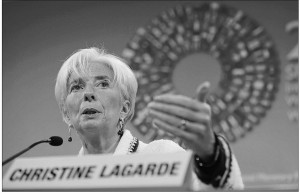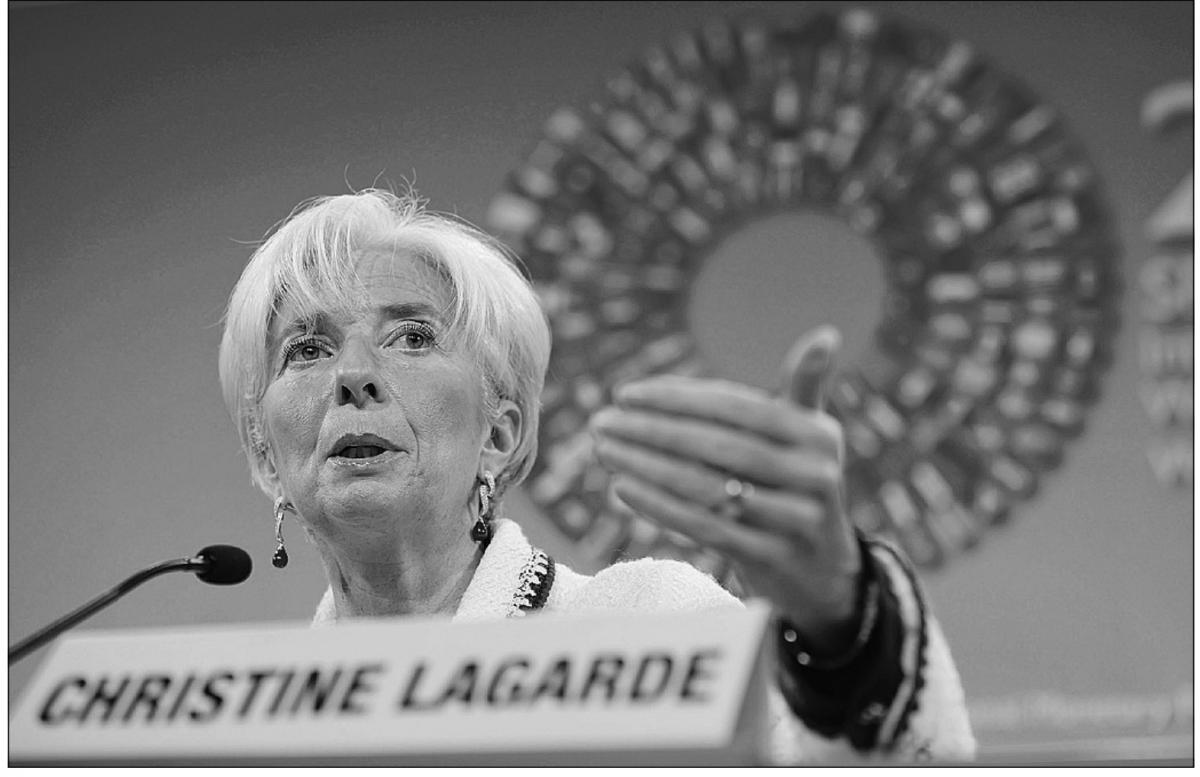
(AFP PHOTO)
By: Lamia Nabil
The International Monetary Fund (IMF) announced on Sunday, following a meeting with the Egyptian Government, its commitment towards helping solve the current Egyptian economic crisis, adding that it would continue negotiations over the $4.8bn loan to Egypt.
“I reiterated that the IMF is committed to supporting Egypt in this endeavor,” said Massod Ahmed, director of the Middle East and Central Asia Department of the International Monetary Fund (IMF) during his visit to Cairo yesterday. “We agreed that our discussions would continue diligently over the coming weeks with the aim of reaching agreement on possible financial support from the IMF.”
“I welcome the authorities’ determination to move forward with their economic reform programme that seeks to address these challenges in a socially balanced manner,” he added.
The IMF said that Egypt must move forward to take immediate and practical actions to resolve its economic problems.
“The idea is to discuss with the authorities their economic programme and the next steps in the IMF’s engagement with the country,” said William Murray, deputy spokesman for the External Relations Department at the IMF during press conference, Thursday. “Again I have to underscore that the IMF remains fully committed to supporting Egypt at this critical time through a homegrown programme that addresses the country’s economic and financial challenges and lays the foundation for a durable and socially inclusive recovery of the economy.”
He also said that discussions with the Egyptian authorities are ongoing and that “I don’t want to characterise what form they take”.
Egypt agreed on the IMF loan last November, but requested a delay during unrest and turmoil as a result of President Morsi’s tax amendments aimed at stemming the budget deficit.
“We’ve had very good progress, and we had very constructive discussions,” Massod told reporters after his meeting with Egyptian Prime Minister Hesham Qandil. “Both sides agreed on the need to support a national programme that addresses Egypt’s economic challenges; we agreed that our discussions would continue diligently over the coming weeks with the aim of reaching agreement on possible financial support from the IMF.”
“All the discussions were about financial support or the loan that Egypt aims to obtain from the IMF,” said Alaa Hadidi, cabinet spokesman, to Reuters on Monday. “There is no link between the loan and parliamentary elections.”
Cyprus recently reached to an agreement with IMF over €10m, equivalent to $13m, on 16 March.
“I welcome the agreement reached today to address Cyprus’s economic challenges,” said Christine Lagarde, managing director of the IMF in a press release on Sunday. “The IMF has always said that we would support a solution that is sustainable, that is fully financed, and that appropriately allocates the burden sharing. I believe that the agreed package meets these three objectives. On this basis, I intend to make a recommendation to our Executive Board for the IMF to contribute to the financing of the package”
The Eurogroup, the body that brings together the finance ministers of countries whose currency is the Euro, welcomed the IMF agreement with the Cypriot authorities as the programme will be based on “ambitious measures to ensure the stability of the financial sector, determined action to carry out the required fiscal adjustment and structural reforms to support competitiveness as well as sustainable and balanced growth, allowing for the unwinding of macroeconomic imbalances”, according to a Eurogroup statement on Sunday
Commenting on the loan, economic expert Rashad Abdo said that the difference between IMF’s aid to Egypt and Cyprus is that Cyprus is supported by the Eurogroup “as the group will always support its members, as well as the French banks and German banks which have bought Cypriot treasury bills and bonds” and which will “directly affect those banks in case anything negative happens in Cyprus”.
“Also, Cyprus doesn’t have the Muslim Brotherhood in power,” he said. “As well as the turmoil and unrest in the streets which we are currently experiencing.”
“There are no any Egyptians, either in power or ordinary Egyptians, to support Egypt,” he continued. “So how can we expect support from other countries?”
He added that the Egyptian Government had failed to put forward “a good economic reform plan in order to meet the IMF’s expectations or to reassure them regarding the Egyptian economy.”




